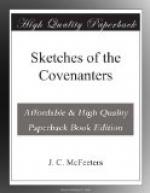Three men under the king were chiefly responsible for these atrocities, and all three were reprobate Covenanters. Their names can be mentioned only with abhorrence and detestation; the Earl of Lauderdale, the Earl of Rothes, and Archbishop Sharp. Lauderdale, formerly known as John Maitland, one of the Scotch Commissioners at the Westminster Assembly, shined in that bright galaxy as a morning star; but like Lucifer, son of the morning, he fell from the glory-crested height. Rothes was the son of the Earl of Rothes, celebrated for his active part in the Covenant of 1638. Archbishop Sharp was a Covenanted minister, previous to the restoration of King Charles. Such were the chief actors in these scenes of infernal cruelty practiced upon the Covenanters. Surely they could not have been so atrociously wicked, had they not been previously exalted to heaven in privilege and by profession. Satan could not have been the devil, had he not first been an angel.
[Illustration: Rutherford’s monument at Anwoth.
Rutherford’s pastorate at Anwoth was pleasant and prosperous. His church was filled with people, and his home was the abode of peace. Yet that blessed home was disturbed by the persecutor. Rutherford was condemned, and compelled to abide at Aberdeen as a prisoner, “six quarters of ane yeir.” The glory of the Lord was there upon him, and he called his prison, “Christ’s Palace.”]
Some prisoners taken at Rullion Green were, after their execution, utilized by the government, for the intimidation of the Covenanters. Their heads were set up in public places in various cities, as a gruesome warning to all others. These men, when on the way to Rullion Green, had paused at Lanark to renew their Covenant. There they lifted up the right hand to heaven, making their appeal to God. Now those right hands are cut off and set up on spikes over the gates of the city—a grim admonition to the living.
Some of the prisoners were reserved for the slower process of law, and the severer operations of cruelty. John Neilson became conspicuous through the tortures he endured, the noble spirit he displayed, and the death by which he glorified God. He was a man renowned for his wealth, as well as for great-heartedness. The preceding year Sir James Turner, when commanding the king’s troops, despoiled him of his property; yet when that lawless officer had been taken prisoner by the Covenanters, Neilson pleaded for him and saved his life. Now Neilson is in his hands. Will the kindness be returned? Ah, kindness returned! Rather feel for a pulse in the cold granite or look upon the white marble for a loving smile.
The Court questioned Neilson, but his answers were not satisfactory. They tortured him, but could extract nothing further. They thrust one of his legs into an iron boot, and crushed it with a wedge, driven between the flesh and the iron; yet nothing but groans were extorted from him. Filled with wrath, because a confession involving others could not be elicited, they passed the death sentence on him. He went cheerfully to the scaffold.




